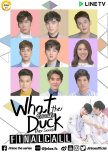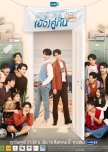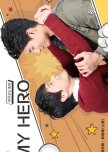
Cette critique peut contenir des spoilers
Familiar Story Rings True
This is a familiar formula of boy who bullies his love interest because he doesn't know how to properly express his feelings or even understand them. The big plus for this series is we get to focus on our two lovers without the distraction of sub plots. The kidnapping sequence was a bit over-the-top while the scene between Din Jun Jie and his long-time female friend Meng Yao was more realistic. I thought there was going to be a love triangle with Ding Jun Jie's childhood friend Jiang Zhihao but that didn't develop. Too bad because the storyline was a bit bland and a love triangle would have made this much more interesting. Nevertheless, Jiang Zhihao's outrage at being dumped for a girl is a very real dramatic moment -- maybe the best second best scene in the piece. The ending, while tragic, also rings true and the writer does a good job of giving our heroes a hopeful future. I'm giving the music a 10 -- particularly the song used to underscore the snow montage in the final episode, which I assume is called "Buried in the Past." This snow scene is beautifully rendered and really sells the cold misery of our two lovers. Well done.Cet avis était-il utile?

Dark Blue and Moonlight
0 personnes ont trouvé cette critique utile
Cette critique peut contenir des spoilers
Engaging Love Triangle
Overall, I liked this drama. I give it high marks for avoiding the worst of the gay cliches. Hai Qing (Aric Chen) is gay and in love with two slightly older men, wealthy and self-centered Fei (Tom Wang) and kind but poor and hardworking Pin Jun (Tim Huang). We're spared the usual BL agony of the characters trying to come to grips with being attracted to guys. Big bonus points for that. There are a couple of gay hate scenes from outsiders, but never more than hazing. We're also spared the cliché awkward bed scenes. Director Adiamond Lee moves the story along quickly and more or less logically. I never felt like the drama was padded with unnecessary scenes to fill time. I would have given the drama a 10 except for the abrupt and confusing ending. I had to watch the final scene a few times to figure out what happened. Apparently, Hai Qing chooses not to pursue either relationship and, instead, goes to America to finishing his schooling. Not the ending I was hoping for, but probably the right choice for the story. It does make sense that 19-year-old Hai Qing is too young to settle down just yet. In the final seconds he's writing a letter to Pin Jun, so we're left to speculate he may go back to him some day. The storyline of Fei's other boyfriend Jimmy (Charles Lin) is left unresolved. Maybe we're being set-up for a sequel? The main characters are well drawn and three dimensional, even the Jimmy and "Pinky" (Zahn Ya Han) characters. The character of Hai Qing's father could have used a few more scenes to better foreshadow the drama's conclusion. Hai Qing's apparent preference for Fei could have used some more exposition. We're left to assume it's more of a physical attraction or perhaps his wealth. It's pretty clear that Pin Jun is his soulmate, though. Happily, this is only 12 episodes so it's worth your time to enjoy the characters and their romantic encounters.Cet avis était-il utile?

'Cause You're My Boy
0 personnes ont trouvé cette critique utile
Cette critique peut contenir des spoilers
Strong Characters Overcome Weak Plot
I'm not going to try to explain the plot because the characters really drive the interest of this story. The main couple, Mork (Drake Sattabut) and Tee (Frank Thanatsaran) have known each other since middle school. There was an early misunderstanding that drove them apart until high school, when this story takes place. (I'm assuming it's high school because it's never clear. They seem to skip classes so often its a wonder they aren't expelled). It's pretty clear Tee is gay and certain of his feelings but he hesitates to express them to Mork. We watch Mork evolve from an indifferent acquaintance to a loving, maybe-gay partner who is the most invested in their relationship. Meanwhile, Mork's younger brother Morn (Phuwin Tangsakyuen) is having a growing bromance with this friend Gord (Neo Trai). Given these two boys are in middle school, their drama is a bit more unusual and interesting to watch. At the conclusion, Mork and Tee get engaged, even though they've never gone beyond kissing. The story asks if they really need to go beyond that to be in love and it's a good question. I have to think there must be many straight couples who partner just for companionship. But I suspect the audience hoped for that final romantic scene as the payoff for 12 hours of viewing. A key plot point is Tee's mom doesn't approve of his gay relationship and tries to drive them away. Then Tee and Mork are involved in a car accident and this changes her mind about them. This scene was poorly executed and really unnecessary. Earlier we had been introduced to Tee's grandmother who approved of his relationship. It would have been far more dramatic and satisfying to the audience for the elder member of the household to scold her daughter for her selfish behavior, Special mention should be given to Khaotung Thanawat who play's Mork's best friend Au, who has a boy crush on Mork. His storyline is a missed opportunity to explore the tragedy of loving someone who doesn't share your affection. There was a hint that Au had a secret admirer of his own, but that's never developed. When these long BL dramas struggle to fill the time, it would be better to develop these more offbeat subplots than repeat the same conflicts with the main characters. On the production side: Thai BL dramas seem to have a lot of sound problems, particularly when characters have physical contact and their shirt worn lavalier microphones are bumped. There are an excessive number of bad mic pick-ups in this series. These should have been dubbed (rerecorded) in the studio. The camera work is better, with only a couple of live focus and framing errors. Indeed, many of the visuals are quite good. On acting, Drake (as Mork) gets most the screen time and he manages to keep his ever-changing character consistent through the story. In the beginning, his character is so stoic we wonder if he'll ever display any emotion, but we grow to love him most at the conclusion. Frank gives us a rather icy Tee who never fully melts into the kind of chemistry we hope for. Playing a 15-year-old middle schooler doesn't give Phuwin (Morn) a very wide pallet of emotions to play with. But we get a nice surprise toward the end of the drama when Morn confronts Gord about the shallowness of their relationship. The final hugging scene is nicely drawn. Neo Trai delivers a wonderfully subtle performance showing Gord's struggle with wanting to reveal his true feelings toward Morn but fearing he might drive him away. His confrontational speech with Morn is a highlight of the show. It's too bad the script didn't go through one more rewrite because some minor fixes could have made this show an easy 10 rating. Still, I can recommend it for Drake's performance and the secondary story involving Morn and Gord.Cet avis était-il utile?

Cette critique peut contenir des spoilers
Familiar BL Theme Leads to Dead End
Well, I was really looking forward to a final episode where Mitsuru wakes up from a dream to find Koichi really isn't dead. But you really can't have a same gender love story without one (or both) of the heroes dying a violent death or living out their lives in misery and loneliness. Here we get both cliches. That kills any re-watch value for me. But I'll give the writer credit for the dad accepting the same-sex romance of his son without question or the usual parental hysterics. Yuki Matsumura gives the stand-out performance as Mitsuru's dad, with a lovely speech in the final episode. As for the two leads, Sora Inoue is a bit too stoic for me. He seems disinterested in nearly every scene. He does get one good crying scene at the end, but even that's a bit too subtle. Fortunately, his love interest Koichi (Rio Komiya) steps up to do the heavy lifting in the kissing scenes. These actors look good together so I'd give them a look in a better story. The music may be the best part of this show. It's simple but on point in every scene. I rewatched sections just to hear the music again. The theme of dead partners has become a bit of a cliche in boy love dramas. As these are written for girls, I assume the message to guys is -- get back to dating girls or you'll end up lonely and miserable chasing after your dead boyfriend. We probably need more guys to write these Y stories to impart more empathic plots.Cet avis était-il utile?

Cette critique peut contenir des spoilers
Beautiful Cast, Great Stories, Weak on Romance
Thai film schools turn out some great cinematographers and "2gether" is no exception, with stunning visuals, augmented by a beautiful cast. But the audio production of these dramas always leaves a lot to be desired. A common flaw is the body microphones that get bumped on any kind of physical contact. In this series, all of this could have been pretty easily fixed as there was rarely any important dialogue going on. In Hollywood they do extensive ADR and foley replacement to fix these gaps. It really takes you out of the moment when you hear mics bumped and clothes rustling. Another problem with the sound is mixing background music with in-scene music that's in an incompatible musical key. Who thought that was a good idea? Anyway, with that out of the way, "2gether" was one of the most enjoyable BL dramas I've seen. Other reviewers have pointed out that we never get to see much physical intimacy in this one, and that's a shame because the rest of the drama is firing on all cylinders. But I'm going to give the producers a pass on this criticism because I suspect this is a nod to commercial pressures to play down anything that feels "too gay" for a conservative audience. Aside from the one rather stereotypical ("fem") guy, its refreshing to see bromances portrayed without much gender role baggage. I think this is a first step to transitioning a mainstream audience to higher levels of romantic bromance in the future. Overall, a solid 8.5 due to passionate performances by all of the key actors and good direction.Cet avis était-il utile?

Secrets in the Hot Spring
1 personnes ont trouvé cette critique utile
Cette critique peut contenir des spoilers
A Comedy Horror Film That Middle School Girls Will Love
This review and my ratings are based on an understanding the intended audience is primarily pre-teen and teenage girls. The three lead guys are boyband attractive and spend a lot of time with their clothes off -- in a modest, G-rated sort of way. The preamble, where the three guys meet, is way too long and doesn't blend well with the haunted house plot. But I give the script high marks for having a logical explanation for what happens. Too often writers pass these old dark house dramas off to unexplained supernatural resolutions, which is no fun for the audience. The real mystery, though, is the Boys Love drama overtones mixed in with so much homophobia. Yan Siang's character's name "Little Princess" is particularly offensive. But, of course, the BL aspect turns out to be a twist ending, in that it's not been one at all. The characters are wildly uneven, but that's consistent with comic haunted house dramas like the "Goosebumps" series and going way back to classic horror-comedies like Abbott & Costello's "Hold that Ghost" or Don Knott's "The Ghost and Mr. Chicken." As such, I have to give the three lead guys top marks for making the best out of such erratic writing. What's more remarkable is the characters are supposed to be 16-22 and all of the leads were over 26 when this was filmed. Maybe the fountain of youth was the secret in that hot spring?Cet avis était-il utile?

What the Duck 2: Final Call
1 personnes ont trouvé cette critique utile
Cette critique peut contenir des spoilers
Continuing the Tradition of Sexually Ambiguous Bros
Here's a tip to aspiring BL writers: Men are rarely confused about their sexuality by the time they turn 18, although, they may not act on it, due to social prejudice and conditioning. So here we have another story of two sexually ambiguous bros, Oat and Pop. (There are many sub-plots with other characters, but I'm only going to talk about their storyline). We suffer through two seasons of "What the Duck" and our heroes barely have a bromance, never mind anything that gets sexual. There is a brief tease of male rape (a scene right out of "The Effect") but at least this one turns out to be a comical misunderstanding. The BL drama formula says that it's fun to watch two guys make out, but let's not let them actually be gay and have a happy ending together. So, this show concludes with Pop departing to become a flight attendant and Oat (after an incredible effort to befriend Pop) decides to ditch him to become ... are you ready for this? ... a Monk. Yes, really. That defies psychological physics. Pop has been pretty well established as straight (he has a girlfriend). It would be a stretch for him to switch teams at age 22. Oat has lots of sex with himself. He could be interested in Pop, but maybe he became a Monk because he knows Pop is a lost cause. (A gay man being attracted to a straight guy is a real life tragedy for many gay men). So there's really only one logical ending to this drama, in the presumed Season 3: Pop: "I really do love you, Oat, but I just can't get into the gay thing." Oat, putting his hand on Pop's shoulder: "Honestly, I don't care about that either, Pop. Just having you as a friend is enough for me." Oat starts to kiss Pop on the lips, but in the last second gives him a peck on the cheek. Amused at Oat's shyness, Pop smiles, stares into his eyes and gives him a bro kiss on the lips. Oat wipes his lips with the back of his hand, "Pop!" They laugh and walk off together. The End. Oreo Puwanai (Pop) and Strong Charoenchai (Oat) manage to create some chemistry together, despite the dysfunctional personalities their characters are given. It's fine to start out that way but by the end of the first season their character arcs should have evolved to be more friendly toward each other. Will there be a season 3? Will our boys get together? I'm not holding my breath. I'll leave them with my suggested ending.Cet avis était-il utile?

Cette critique peut contenir des spoilers
Delightful BromCom Avoids Most of the Worst BL Cliches
There' s a lot to like here. The pacing is even and each episode offers new surprises while avoiding most of the worst BL cliches. Special recognition should be given to the inspirational camp sequence where teaching the students that cooperation is superior to competition wins the game. Bravo! The main plot where two more or less straight dudes accidentally think the other has a bromantic interest in him is an interesting premise. We've seen this where one guy has the wrong impression but I don't think I've ever seen BOTH share the misconception. Later, of course, they become attracted to each other. Despite the promising plot, I found the main characters, Aoki and Ida a bit stiff and dull. Aoki plays a bit into the Y-drama effeminate male stereotype while Ida is mostly bland and two-dimensional -- but, on the plus side, Ida isn't the abusive, closeted gay cliche. The question of what two dudes do on a date is asked over and over again, but we never get a really good answer. Instead we get repetitive series of misunderstandings followed by apology scenes, which gets a bit tiresome. The intertwined double love triangles Aoki-Hashimoto-Ida-Aida/Akkun is nicely rendered here, so we never feel like we've left the main story for a side plot. I can't fault the lead actors, who are clearly doing their best with rather dull character development. But don't let my overall rating discourage you from watching this light BromCom. There was a lot of potential here that was not fully developed.Cet avis était-il utile?

Cette critique peut contenir des spoilers
Attractive Cast But the Story is Like Watching Ice Melt
Others have noted this is a chaotic mess. It was only the strength of the main love story that kept me engaged to the end. Even so, the main story didn't have enough backstory to lead us to the odd conclusion. All of the storylines are left dangling so there's no sense of closure here. There are long periods of the characters staring at each other, presumably to pad the episodes out. The fairly straightforward love story is hijacked by these side stories of unlikeable, outlandish gay stereotypes. Frankly, I fast-forwarded through those scenes. It feels like they had a halfway decent writer plot out the love story but then gave it to a bunch of drunk frat boys to pad it out with slapstick humor. But I'd be happy to see these actors again, in a better show.Cet avis était-il utile?

Cette critique peut contenir des spoilers
Generally satisfying bromance with high production values
The Thai Film Industry still sets the gold standard for production values in BL dramas. "Oxygen" is beautifully photographed, the soundtrack is flawless and the score is excellent. In fact, it was refreshing to have a real film score and not have variations of the OST pop songs repeating over and over again. I did note one major editing error, where the Phuri character starts to give his love interest Kao a sponge bath and the actor who plays Kao starts to laugh. The cut-away is way too late. But that little blooper aside, this is an enjoyable multi-bromance soap opera. It's interesting they use the word "gay" (at least in the English translation) because nothing particularly "gay" happens here, except for some light kissing and hand holding. There's enough of a plot to sustain, maybe 8 episodes but it feels like there's a lot of padding to stretch it to 13, 45-minute shows. All of the characters are likable, except for Phuri who is sort of inexplicably indifferent to everything -- except when he's called on to resolve a fist fight. The most interesting bit of drama comes early on when Solo is given a date rape drug by a female admirer who wants to video tape a sexual encounter to post online. Women are often irrelevant characters in these Yaoi dramas -- or they're a catalyst to get to guys together, and there is one of these sub-plots, so this was a fresh addition. The various male pairings do conform slightly to the seme-uke stereotypes, but at least its pretty subtle. All of the guys stay in the masculine gender role lane. The writing may be more clever than it appears at first glance, as I noted a number of motifs that could be interpreted as double entendres, but I'll have to leave that to your imagination. I give "Oxygen" a high re-watch score for the outstanding production values and acting, even if the plots are a bit too familiar.Cet avis était-il utile?

Cette critique peut contenir des spoilers
A Story About Coming of Age With Too Much Drama in Your Life
"The Judgement" is about the evils of prejudice and competition over cooperation. It's also about money, power, bullying (particularly on social media), political corruption and we get both female and male rape scenes. (It's interesting that there isn't much said about the male rape). The dialogue is well above average and the many sub-plots somehow manage to connect with one another. But the body count in this everyday college melodrama is higher than a police procedural about a serial killer. The cast is quite good. Stand-outs are the dual role played by Mond Tanutchai (Namnhao and Namnuesa). He plays twin brothers so effectively that I didn't realize he was playing both parts until after the drama was over. Peem Jaiyen (Aud) has the most complicated role as sort of an anti-hero. He's young, powerful, with an over-developed sex drive that gets him into trouble. Typically this kind of character is very two dimensional with no redeeming qualities, but Peem lets Aud walk down that thin, grey line that separates loving and hating a character with great skill. Got Liewrakolan isn't given too much to do in his supporting role of Potae but if you've seen him in "The Underwear," you'll be impressed with a very different character here. Too bad he wasn't given the role of Arch (played by Kacha Nontanun) which is so under-played that he seems bored with everything (until the last episode). The final scene is quite powerful with a nice twist ending, but we don't get much more resolution than "life will go on." I think we're being set-up for a sequel, though. We'll see.Cet avis était-il utile?

Cette critique peut contenir des spoilers
Resolves The Problems of the Original Series
The original "2gether" series is one of the better BL dramas. It's got the best looking collection of actors and mostly plausible storylines. But the first series played down the romantic elements so much that our main characters, Tine & Sarawat barely get beyond a straight bromance. And the much promised "Kiss until you drop" is never delivered. A new director was brought in for "Still 2gether" and the results are much improved. Tine & Sarawat still never reach the romantic gold standard set by Tutor (Saint) and Fighter (Zee Pruk) in the "Why R U?" series but we do get to see a nice kissing scene in the final act. I'll defer to the producers of BL dramas who know their audience better than me, but I do find it odd that they'll steer clear of anything that gets too "gay" while, at the same time, embracing tired gay stereotypes like calling a partner a "wife" or "wifey" and introducing over-the-top, girly-acting characters -- presumably for cheap laughs. This undermines the normalizing of same-sex partnerships. The highlight of this series is Win Metawin's touching performance when his character, Tine, sits alone by the pool, missing his traveling boyfriend and talking to a doll with the likeness of Sarawat. Up to this point, I've never been convinced that Tine, who was introduced as decidedly heterosexual, had bought into a same-sex relationship. (Sarawat clearly liked boys at the onset). So this was a much-needed resolution to that issue. This is Win's first major role. Blessedly, the sequel is only 5 episodes and it nicely resolves most of the loose ends of the original series without padding the drama out to 13 hours. I like these characters. It would be interesting to wait about 5 years for another visit and maybe, by then, the audience (and the actors) will be a little more accepting of the kind of intimacy we've seen in "Why RU?"Cet avis était-il utile?

Cette critique peut contenir des spoilers
Interesting Study of Gender Roles
As others have noted, this drama is a bit confusing. At first I though putting a girl in a man's body was a way to get around any boys love hangups the audience or the actors may have had. In fact, when we get to the big kissing moment at the end, there's a cut from the two guys to the girl ghost who takes over the boy's body. But we do get a satisfying resolution in the end. Upon second viewing, there's a lot of subtext that comes to the surface about gender roles. One of the commonly noted benefits of close male friendships is guys are less inhibited about talking about their true feelings, as when Mai Ying Xiong reveals to Gu Si Ren what he really feels about his girlfriend, Lan Xi. The main problem with the plot is we're never quite sure who Gu Si Ren is supposed to be, himself in his previous life (having a man crush on Mai Ying Xiong) or the girlfriend as a ghost, inhabiting his body. The limbo scenes in heaven (?) are just time wasted. I would rather have spent more time with the man characters. But I give this drama high marks for the main two male leads who really sell the attraction of their characters. The mystery of the notebook is a nice touch.Cet avis était-il utile?

Où tes yeux s'attardent
0 personnes ont trouvé cette critique utile
Cette critique peut contenir des spoilers
A Real BL from Korea!
What's not to like about this one? Great story. Great actors. Happy ending. It falls short of a 10 rating only because I can't believe these two guys have known each other practically since birth and only now, at age 18, are they are revealing their true feelings. The script could have used a few flashbacks or even a few dialogue references to hints about their evolving attraction as they were growing up. Some of the character motivations were a bit illogical, like why was Tae Joo trying so hard to hook up his friend with a girl? Why was Tae Joo such a ladies man, breaking the hearts of several girls at once? Well, I suppose he was playing the role of a straight guy to disguise his true orientation. And maybe forcing Kang Gook to date a girl would force him out of the closet? Tae Joo's Mafia Boss-like father, with his James Bond villain-like henchman, was a bit over-the-top -- unintentional comic relief that distracted from the tone of the drama. The restaurant owner with "gaydar" and the running approval of Tae Joo & Kang Gook's relationship was a nice touch.Cet avis était-il utile?

Cette critique peut contenir des spoilers
Two Dysfunctional Guys Hook Up
Hira is a stereotypical shy, nerdy high school senior who falls in love at first sight of Kiyoi, an egotistical bastard who is too full of himself for words. Hira stalks Kiyoi all through their senior year while Kiyoi continues to resent Hira outwardly, but under the surface Kiyoi is coming to terms with his own attraction to Hira. On the last day of school Kioyi gets the courage to kiss Hira, but like the rest of their dysfunctional relationship, it doesn't go well and they boys are now separated as Hira goes to college and Kiyoi starts his acting career. In the college camera club, Hira meets Koyama, who quickly falls in love with dysfunctional Hira, who is still longing for Kiyoi. Eventually, Hira does hook up with Kiyoi but we are left wondering how long such a relationship would last. "My Beautiful Man" follows the typical Y drama formula with the shy lead pursuing an abusive love interest, although here, Kiyoi never seems to fully embrace their bromance. Hira's stuttering becomes a bit tiresome after the first episode. At first the story seems to pose the question, "can opposites attract?" but in the end we realize both our heroes suffer from narcissistic personality disorder. I wanted to like these characters but ended up wishing Koyama was the hero. While his appearance is all too brief, he has the best scenes. If I were plotting out the six episodes, I would have concluded the high school years at episode 3 and given more time to the far more interesting bromance between Hira and Koyama. The performances are all on point and the production values are sparkling. The standout performance is Takano Akira's Koyama Kazuki, so I'm looking forward to seeing him in future dramas.Cet avis était-il utile?





